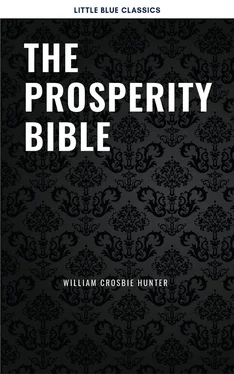–Edmondo De Amicis, College Friends .
Suggestions for the Use of Description
Decide, on beginning a description, what point of view you wish your hearers to take. One cannot see either a mountain or a man on all sides at once. Establish a view-point, and do not shift without giving notice.
Choose an attitude toward your subject—shall it be idealized? caricatured? ridiculed? exaggerated? defended? or described impartially?
Be sure of your mood, too, for it will color the subject to be described. Melancholy will make a rose-garden look gray.
Adopt an order in which you will proceed—do not shift backward and forward from near to far, remote to close in time, general to particular, large to small, important to unimportant, concrete to abstract, physical to mental; but follow your chosen order. Scattered and shifting observations produce hazy impressions just as a moving camera spoils the time-exposure.
Do not go into needless minutiæ. Some details identify a thing with its class, while other details differentiate it from its class. Choose only the significant, suggestive characteristics and bring those out with terse vividness. Learn a lesson from the few strokes used by the poster artist.
In determining what to describe and what merely to name, seek to read the knowledge of your audience. The difference to them between the unknown and the known is a vital one also to you.
Relentlessly cut out all ideas and words not necessary to produce the effect you desire. Each element in a mental picture either helps or hinders. Be sure they do not hinder, for they cannot be passively present in any discourse.
Interruptions of the description to make side-remarks are as powerful to destroy unity as are scattered descriptive phrases. The only visual impression that can be effective is one that is unified.
In describing, try to call up the emotions you felt when first you saw the scene, and then try to reproduce those emotions in your hearers. Description is primarily emotional in its appeal; nothing can be more deadly dull than a cold, unemotional outline, while nothing leaves a warmer impression than a glowing, spirited description.
Give a swift and vivid general view at the close of the portrayal. First and final impressions remain the longest. The mind may be trained to take in the characteristic points of a subject, so as to view in a single scene, action, experience, or character, a unified impression of the whole. To describe a thing as a whole you must first see it as a whole. Master that art and you have mastered description to the last degree.
SELECTIONS FOR PRACTISE
THE HOMES OF THE PEOPLE
I went to Washington the other day, and I stood on the Capitol Hill; my heart beat quick as I looked at the towering marble of my country's Capitol and the mist gathered in my eyes as I thought of its tremendous significance, and the armies and the treasury, and the judges and the President, and the Congress and the courts, and all that was gathered there. And I felt that the sun in all its course could not look down on a better sight than that majestic home of a republic that had taught the world its best lessons of liberty. And I felt that if honor and wisdom and justice abided therein, the world would at last owe to that great house in which the ark of the covenant of my country is lodged, its final uplifting and its regeneration.
Two days afterward, I went to visit a friend in the country, a modest man, with a quiet country home. It was just a simple, unpretentious house, set about with big trees, encircled in meadow and field rich with the promise of harvest. The fragrance of the pink and hollyhock in the front yard was mingled with the aroma of the orchard and of the gardens, and resonant with the cluck of poultry and the hum of bees.
Inside was quiet, cleanliness, thrift, and comfort. There was the old clock that had welcomed, in steady measure, every newcomer to the family, that had ticked the solemn requiem of the dead, and had kept company with the watcher at the bedside. There were the big, restful beds and the old, open fireplace, and the old family Bible, thumbed with the fingers of hands long since still, and wet with the tears of eyes long since closed, holding the simple annals of the family and the heart and the conscience of the home.
Outside, there stood my friend, the master, a simple, upright man, with no mortgage on his roof, no lien on his growing crops, master of his land and master of himself. There was his old father, an aged, trembling man, but happy in the heart and home of his son. And as they started to their home, the hands of the old man went down on the young man's shoulder, laying there the unspeakable blessing of the honored and grateful father and ennobling it with the knighthood of the fifth commandment.
And as they reached the door the old mother came with the sunset falling fair on her face, and lighting up her deep, patient eyes, while her lips, trembling with the rich music of her heart, bade her husband and son welcome to their home. Beyond was the housewife, busy with her household cares, clean of heart and conscience, the buckler and helpmeet of her husband. Down the lane came the children, trooping home after the cows, seeking as truant birds do the quiet of their home nest.
And I saw the night come down on that house, falling gently as the wings of the unseen dove. And the old man—while a startled bird called from the forest, and the trees were shrill with the cricket's cry, and the stars were swarming in the sky—got the family around him, and, taking the old Bible from the table, called them to their knees, the little baby hiding in the folds of its mother's dress, while he closed the record of that simple day by calling down God's benediction on that family and that home. And while I gazed, the vision of that marble Capitol faded. Forgotten were its treasures and its majesty and I said, "Oh, surely here in the homes of the people are lodged at last the strength and the responsibility of this government, the hope and the promise of this republic."—Henry W. Grady.
SUGGESTIVE SCENES
One thing in life calls for another; there is a fitness in events and places. The sight of a pleasant arbor puts it in our mind to sit there. One place suggests work, another idleness, a third early rising and long rambles in the dew. The effect of night, of any flowing water, of lighted cities, of the peep of day, of ships, of the open ocean, calls up in the mind an army of anonymous desires and pleasures. Something, we feel, should happen; we know not what, yet we proceed in quest of it. And many of the happiest hours in life fleet by us in this vain attendance on the genius of the place and moment. It is thus that tracts of young fir, and low rocks that reach into deep soundings, particularly delight and torture me. Something must have happened in such places, and perhaps ages back, to members of my race; and when I was a child I tried to invent appropriate games for them, as I still try, just as vainly, to fit them with the proper story. Some places speak distinctly. Certain dank gardens cry aloud for a murder; certain old houses demand to be haunted; certain coasts are set aside for shipwreck. Other spots again seem to abide their destiny, suggestive and impenetrable, "miching mallecho." The inn at Burford Bridge, with its arbours and green garden and silent, eddying river—though it is known already as the place where Keats wrote some of his Endymion and Nelson parted from his Emma—still seems to wait the coming of the appropriate legend. Within these ivied walls, behind these old green shutters, some further business smoulders, waiting for its hour. The old Hawes Inn at the Queen's ferry makes a similar call upon my fancy. There it stands, apart from the town, beside the pier, in a climate of its own, half inland, half marine—in front, the ferry bubbling with the tide and the guard-ship swinging to her anchor; behind, the old garden with the trees. Americans seek it already for the sake of Lovel and Oldbuck, who dined there at the beginning of the Antiquary . But you need not tell me—that is not all; there is some story, unrecorded or not yet complete, which must express the meaning of that inn more fully… . I have lived both at the Hawes and Burford in a perpetual flutter, on the heel, as it seemed, of some adventure that should justify the place; but though the feeling had me to bed at night and called me again at morning in one unbroken round of pleasure and suspense, nothing befell me in either worth remark. The man or the hour had not yet come; but some day, I think, a boat shall put off from the Queen's ferry, fraught with a dear cargo, and some frosty night a horseman, on a tragic errand, rattle with his whip upon the green shutters at the inn at Burford.
Читать дальше












